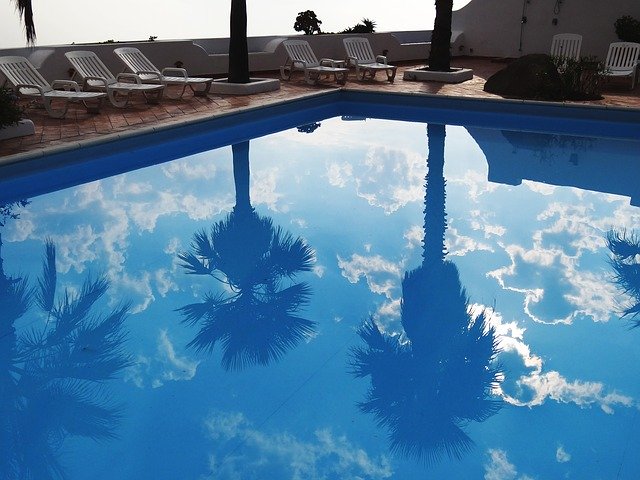
Covid-19 has changed our everyday life. Every one must add new tasks to their daily routine to stay healthy and keep away from this deadly contagious virus.
Many businesses are resuming their operations after many weeks or months of being locked down by the government. Also, people are ready to move on with their lives. But with the re-opening of businesses, the government has set some guidelines and precautions that must be followed to ensure their safety and the safety of others.
After knowing the consequences and witnessing the impacts made by Covid-19, now it is our responsibility to keep the surroundings clean and healthy.
We have done some research in understanding the facts and myths about the transmissible COVID-19 through different means and came up with some instructions for people who have swimming pools at home, hot tubs, water playgrounds, and a business that offer swimming classes to kids.
Sterilizing your swimming pool:
Based on the statement made by the CDC (Centre for Disease Control and Protection), we have no evidence that there are victims of COVID-19 infected through pool waters. Surely this can be a sigh of relief, but negligence can cost lives. The following measures can help people to fight this invisible enemy.
Use of user-friendly chemicals to disinfect water
Chlorine can be considered one of the best disinfectants. This easy-to-use chemical is available in various forms and will have different levels of protection for your pool. Chlorine in the form of hypochlorous acid (HOCl) or Hypochlorite (OCl-) is used often.
Trichloride is available in the form of tablets/powder, which will help you in disinfecting water. Tablets from the skimmer pump safe and clean water to the pool.
Dichloride form, known as oxidizer/chlorinator, helps as a powerful water purifier. Swimming pools with no proper maintenance for ages can use multi-action tablets along with Chlorine to get back to healthy hygiene life again.
Go through proper guidelines for using Chlorine, as excess Chlorine in the pool can cause eye and mucous membrane irritation.
In modern days, people knowledgeable about Chlorine usage are trying to sanitize their pools without using Chlorine.
There are other alternative ways to sanitize pools by avoiding direct Chlorine addition to the pool water. Salt sanitizers referred to as saltwater pools use electrolysis transformation of salt into chlorine gas and help in disinfecting the pool.
Additional Read: How To Test And Balance Your Swimming Pool Water?
Ozonators are another option to sterilize the pool water. The benefits of ozone injection to the water help clear bacteria, yeasts, fungi, etc., remove human contaminants like natural and organic oils, and more importantly, reduces the use of other maintenance procedures.
This method can be the best option to disinfect the pool because it reverts from the ozone to regular oxygen, and hence there are no leftovers in the pool.
Another effective way is to use UV pool sanitizing light, a modern technological innovation to kill or inactivate microorganisms disrupting their DNA in swimming pools.
This process works well in all the climates reducing the maintenance cost of the pool managers. Another advantage of using UV is that there exist no side effects.
Check the pH level of water before getting in the pool
The higher pH level of the water does not impact any health risk to humans, but the side effects include dry, itchy, and irritated skin.
Before getting into the water, make sure to check the pH level of the water to avoid allergies caused by algae in the pool.
Borates help to maintain the proper pH of the water, and it also helps in the prevention of algae, soften the water, control chlorine usage, and reduce the pool shock treatment.
In case of substantial pH value in the pool water, we can use muriatic acid to lower it. Muriatic acid helps in scaling, removing rust stains, and cleaning pool surface and calcium deposits.
The durable acidic nature of Muriatic acid helps in killing stubborn algae. But it is highly recommended to use this acid under expert guidance as excess muriatic acid can lower the pH of the water in the pool.
Sanitize your pool area
People often work to keep the water clean but forget to clean the pool surroundings. It is equally important to take care of every part of the pool for health reasons.
Regularly change your pool water
It is always best practice to change the pool water often. Even before this COVID-19 phase, every pool owner’s routine is to do so. A regular pool water change will help people to stay away from bacteria that can survive even after adding chemical disinfectants.
Get it covered after use
After every swimming session, it is good practice to cover the pool to avoid dust and ensure no trash is let into the swimming pool unknowingly.
Especially in winters, covers on the pool can help you in preventing pool stains and changes in algae growth underwater. Poor water balance also can damage the pool surfaces.
Pool owners who have a pool should be careful about the people whom they allow to use their pool. It is your responsibility to keep your pools safe and to keep the people who use your pool safe. Stay safe. Say healthy.


